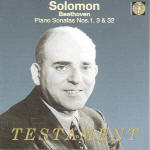Compared to an earlier EMI Références transfer, Solomon’s 1951 Beethoven Op. 111 sounds slightly fuller of body in Paul Bailey’s remastering for Testament. That said, I prefer the pianist’s rarer 1948 HMV reading reissued by Pearl. Here Solomon captures more of the first movement’s jolting thunder, and is technically cleaner in the Arietta. Neither performance, however, fully captures the quivering strife in the work’s visionary final pages. My favorable verdict vis-à-vis Solomon’s 1948 Op. 2 No. 3 (type Q1867 in Search Reviews) needs no reiteration, although Testament’s quiet, clear transfer lacks the bass information and ambient warmth of Pearl’s noisier restoration. Solomon takes the F minor Op. 1 Sonata’s outer movements at a breathtaking yet immaculately controlled clip. The Adagio and Allegretto movements are pellucid, sparely pedaled, and voiced as though Solomon’s hands transformed themselves into a veritable chamber ensemble. Not the acme of Solomon’s Beethoven, perhaps, but what’s good here is lasting.
































